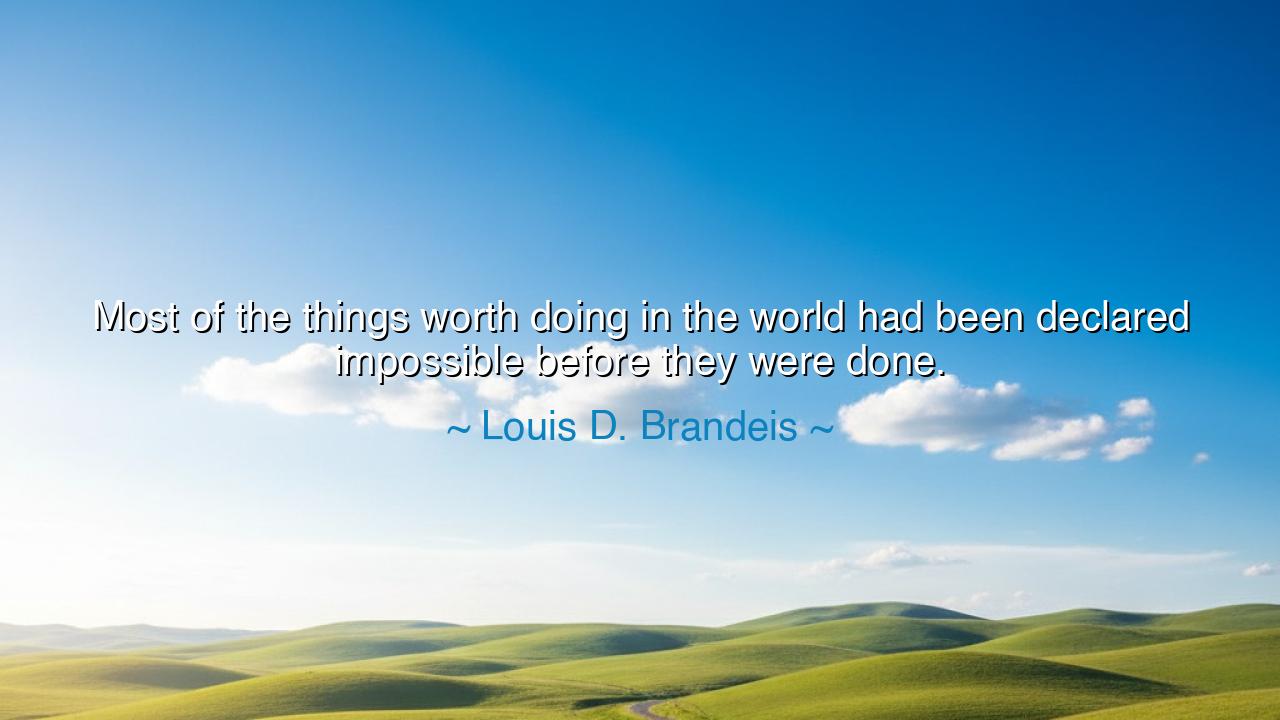
Most of the things worth doing in the world had been declared
Most of the things worth doing in the world had been declared impossible before they were done.






“Most of the things worth doing in the world had been declared impossible before they were done.” — Louis D. Brandeis
Thus spoke Louis D. Brandeis, the wise jurist and fierce defender of justice, whose words echo with the timeless call of human perseverance. In this declaration, Brandeis lifts the veil from the heart of progress itself. When he said, “Most of the things worth doing in the world had been declared impossible before they were done,” he was not speaking only of invention or discovery — he was speaking of the human spirit, of that indestructible fire that burns even when the world calls it folly. He reminds us that every great deed, every advance, every act of courage begins as a defiance of doubt. The impossible is not the wall that stops us, but the gate through which the brave must pass.
The origin of these words lies in Brandeis’s life as a thinker and reformer in early twentieth-century America. A lawyer, philosopher, and later a Justice of the Supreme Court, he spent his life fighting for fairness, for workers’ rights, and for truth in public life. He witnessed again and again how new ideas were first mocked, resisted, and labeled impossible — until persistence made them inevitable. Whether it was the rise of democracy, the abolition of slavery, or the empowerment of the poor, Brandeis saw that progress always meets the same fate: it is doubted, then resisted, then finally accepted as self-evident. His words are both an observation and a challenge — to dare the impossible, for only through daring does the world advance.
Consider the great figures of history who lived this truth. When the Wright brothers dreamed of flight, even scientists of their age called them fools. When Marie Curie pursued the invisible forces of radiation, she was warned that such a quest was madness. When Mahatma Gandhi sought to win independence through peace instead of war, the world told him it could not be done. Yet each of these souls looked upon the impossible not as an end, but as a beginning. They understood that what men call impossible is merely unattempted, that the boundary of possibility is stretched by the hand of courage.
The power of this quote lies in its reminder that doubt is universal, but faith is transformative. Every age, every nation, every person must confront the tyranny of “it cannot be done.” The scientist who searches for cures, the artist who dares to speak truth through beauty, the citizen who stands alone against injustice — all are told that their cause is hopeless. But history is written not by those who obey the limits of fear, but by those who defy them. The worthiest things in life — love, freedom, discovery, peace — are always born in the shadow of impossibility.
Brandeis understood that the declaration of “impossible” is often a mask for fear — fear of change, fear of failure, fear of the unknown. The ancients knew this too. When Prometheus stole fire from the gods, he was punished not for failure, but for success — for doing what the gods themselves had deemed impossible for man. Yet because of his daring, civilization began. In the same way, every innovator, every visionary, must endure ridicule and resistance, for the act of creation always challenges the old order. To do what is “worth doing” is to awaken envy, fear, and disbelief — and yet, as Brandeis teaches, it is precisely those things that shape the destiny of humankind.
The lesson is this: when you hear the word impossible, do not shrink — lean in. It is the mark of every great endeavor. Let the skepticism of others be the measure of your mission’s worth. If no one doubts you, you are not reaching far enough. Whether you dream to build, to heal, to write, or to lead, know that all things worth doing demand the courage to face disbelief. The road to greatness is lined with the echoes of those who said “it cannot be done.” Let your answer be your deeds.
So remember the teaching of Louis D. Brandeis: “Most of the things worth doing in the world had been declared impossible before they were done.” Take this not as comfort, but as commandment. When the world says “no,” let your heart whisper “yes.” When others see walls, see doors. For every impossibility is merely a truth awaiting its first believer — and if you have the courage to act, you may yet join the lineage of those who turned the world from what it was into what it could be. The impossible, after all, is not the end of hope — it is its beginning.






AAdministratorAdministrator
Welcome, honored guests. Please leave a comment, we will respond soon